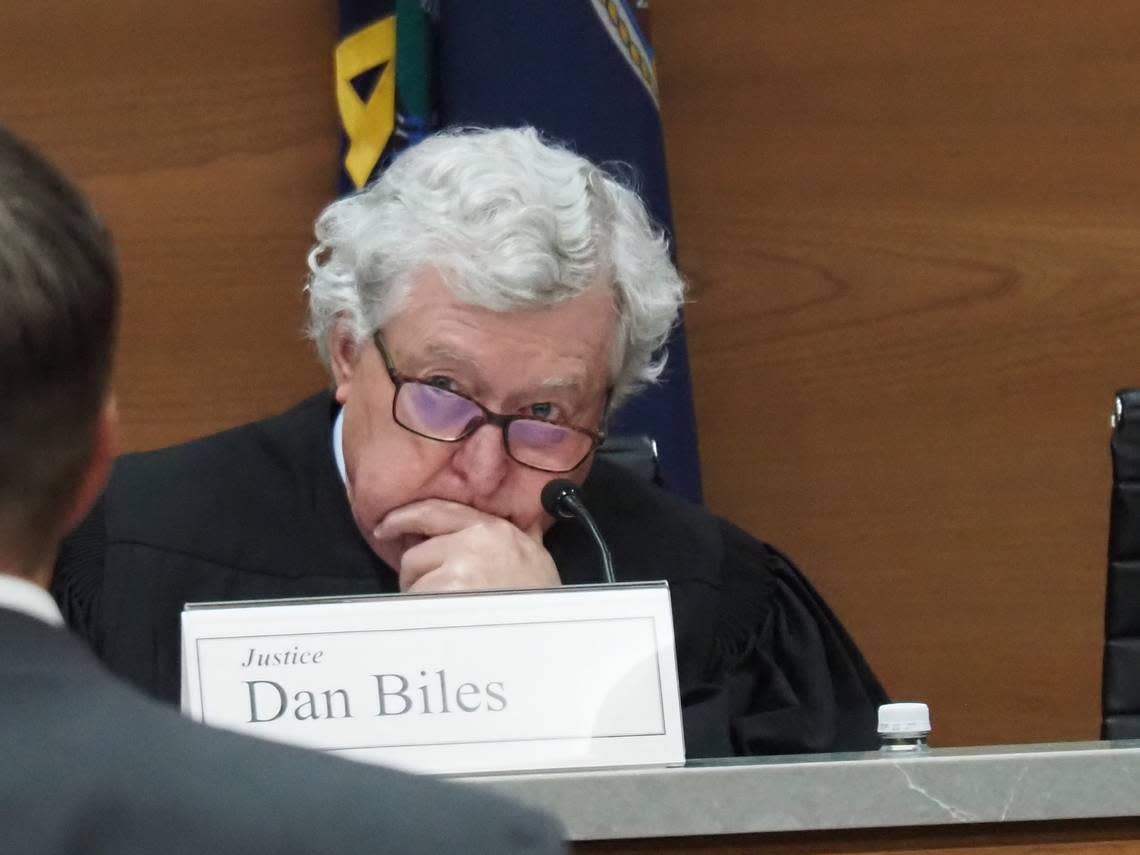Kansas Supreme Court considers case with potential to upend state election law

The Kansas Supreme Court heard arguments Friday in a case that has the potential to upend current and future election laws in Kansas, subjecting them to the highest possible legal bar.
Kansas Attorney General Kris Kobach, a Republican, is asking the court to overturn a court of appeals decision that, earlier this year, determined voting is a fundamental right in Kansas. The ruling referenced a landmark 2019 case finding a right to abortion in the state constitution. That case, the appeals decision said, ruled that any fundamental right should be evaluated with strict scrutiny. Strict scrutiny a high legal bar requiring any restrictions on a right to be narrowly tailored to serve a compelling government interest.
If the Kansas Supreme Court upheld that ruling, Kansas lawmakers could have a much more difficult time passing limits on ballot access and advance voting in the future.
Kobach argued it would also throw existing Kansas election regulations into question.
“Those who wish to change our election laws would be able to mount a credible challenge to the vast majority of what people consider commonplace, completely reasonable restrictions like closing elections at seven o’clock,” Kobach told reporters after Friday’s arguments.
The case centers on two policies lawmakers approved in 2021 following former President Donald J. Trump’s lies about election fraud in the 2020 election. Though Kansas elections are already secure, lawmakers sought to increase that security by requiring signature matching on advance ballots and limiting the number of advanced ballots one person could return on behalf of others.
Elisabeth Frost, an attorney for Elias Law Group, a national firm focused on election law, argued the Legislature approved those policies with insufficient vetting. Even if the goal was to prevent election fraud, Frost argued, these laws would not do that. They would, she said, make it harder to vote.
“Our allegations are that even if these things catch fraud it’s a total accident,” said Frost, who represented the League of Women Voters of Kansas, Loud Light, the Kansas Appleseed Center for Law and Justice and the Topeka Independent Living Resource Center, which all sued to block the law.
By contrast, Frost argued, even under strict scrutiny “most Kansas election laws would get by just fine” so long as they didn’t create systemic burdens to voting without proof of why it was needed.
Kobach, however, argued that voting should be viewed as a fundamentally different kind of right than bodily autonomy, which the argument for strict scrutiny was based on.
“The right to vote requires the government to act,” Kobach said. “It is categorically different.”
Under current interpretations of law, Kobach argued, laws that disenfranchise voters are viewed with the highest scrutiny, but the government is given more leeway to regulate elections and the practice of voting.
Justice Caleb Stegall, the sole conservative on the bench, appeared to agree with Kobach suggesting voting is a “political right” and therefore subject to different standards than “natural rights” like speech, religion or bodily autonomy.
Justice Eric Rosen, appointed by Democratic Gov. Kathleen Sebelius, was also skeptical.
“Where I’m having a challenge here is how it is we decide whatever law or regulation impairs the right to vote,” Rosen asked Frost. “How does that line get drawn? And I think that’s especially challenging because the Constitution recognizes a right to vote but also recognizes the Legislature’s ability to regulate time, place and manner.”
But Rosen and other justices also showed some openness to a high legal standard for protecting access to the ballot, whether it is cast in person or by mail.
“Once the vote is cast, doesn’t the state have the same obligation to ensure that both votes are counted?” Justice Dan Biles, who was appointed by Sebelius, asked Kobach.

